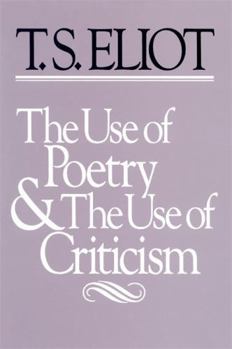The Use of Poetry and Use of Criticism: Studies in the Relation of Criticism to Poetry in England
(Part of the The Charles Eliot Norton Lectures Series)
Select Format
Select Condition 
Book Overview
The 1932-33 Norton Lectures are among the best and most important of T. S. Eliot's critical writings. Tracing the rise of literary self-consciousness from the Elizabethan period to his own day, Eliot does not simply examine the relation of criticism to poetry, but invites us to "start with the supposition that we do not know what poetry is, or what it does or ought to do, or of what use it is; and try to find out, in examining the relation of poetry to criticism, what the use of both of them is."
Eliot begins with the appearance of poetry criticism in the age of Dryden, when poetry became the province of an intellectual aristocracy rather than part of the mind and popular tradition of a whole people. Wordsworth and Coleridge, in their attempt to revolutionize the language of poetry at the end of the eighteenth century, made exaggerated claims for poetry and the poet, culminating in Shelley's assertion that "poets are the unacknowledged legislators of mankind." And, in the doubt and decaying moral definitions of the nineteenth century, Arnold transformed poetry into a surrogate for religion. By studying poetry and criticism in the context of its time, Eliot suggests that we can learn what is permanent about the nature of poetry, and makes a powerful case for both its autonomy and its pluralism in this century.Format:Paperback
Language:English
ISBN:0674931505
ISBN13:9780674931503
Release Date:July 1986
Publisher:Belknap Press
Length:160 Pages
Weight:0.51 lbs.
Dimensions:0.5" x 5.4" x 8.3"
Customer Reviews
1 rating
An Insightful Work On Poetry
Published by Thriftbooks.com User , 25 years ago
Most of us are afraid of poems because as we read it, we can't seem to make head or tails as to what we have read. Therefore, for those of us who have "poem-phobia," I recommend this delightful little work.In this work, Eliot ask the question of what is poetry and the use of criticism in poetry as well as the relationship between the former and the latter. Eliot proposes to start the enquiry by reviewing the history of criticism starting from Elizabethan era untill that of his time. Through the course of the exploration, I was enthralled by Eliot's insightful opinion of critics and their opinion as to what is poetry and its uses. I was particularly drawn to the final chapter of his work which does not offer any final word to the questions which he posed but rather giving us advice as to how to read poems (in particular the modern poets, i.e., 20th century). I was very glad to have read this work because it sure beats reading a heavy college text on how to read poetry.





